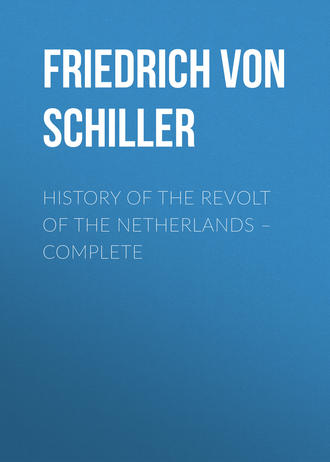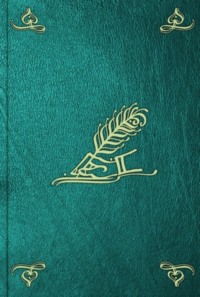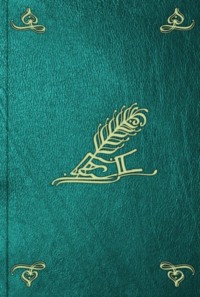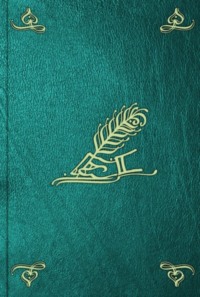 полная версия
полная версияHistory of the Revolt of the Netherlands – Complete
The welfare of the country was so far secured as was necessary to the political schemes of its master; the intelligent policy of Charles would certainly not violate the salutary regiment of the body whose energies he found himself necessitated to exert. Fortunately, the opposite pursuits of selfish ambition, and of disinterested philanthropy, often bring about the same end; and the well-being of a state, which a Marcus Aurelius might propose to himself as a rational object of pursuit, is occasionally promoted by an Augustus or a Louis.
Charles V. was perfectly aware that commerce was the strength of the nation, and that the foundation of their commerce was liberty. He spared its liberty because he needed its strength. Of greater political wisdom, though not more just than his son, he adapted his principles to the exigencies of time and place, and recalled an ordinance in Antwerp and in Madrid which he would under other circumstances have enforced with all the terrors of his power. That which makes the reign of Charles V. particularly remarkable in regard to the Netherlands is the great religious revolution which occurred under it; and which, as the principal cause of the subsequent rebellion, demands a somewhat circumstantial notice. This it was that first brought arbitrary power into the innermost sanctuary of the constitution; taught it to give a dreadful specimen of its might; and, in a measure, legalized it, while it placed republican spirit on a dangerous eminence. And as the latter sank into anarchy and rebellion monarchical power rose to the height of despotism.
Nothing is more natural than the transition from civil liberty to religious freedom. Individuals, as well as communities, who, favored by a happy political constitution, have become acquainted with the rights of man, and accustomed to examine, if not also to create, the law which is to govern them; whose minds have been enlightened by activity, and feelings expanded by the enjoyments of life; whose natural courage has been exalted by internal security and prosperity; such men will not easily surrender themselves to the blind domination of a dull arbitrary creed, and will be the first to emancipate themselves from its yoke. Another circumstance, however, must have greatly tended to diffuse the new religion in these countries. Italy, it might be objected, the seat of the greatest intellectual culture, formerly the scene of the most violent political factions, where a burning climate kindles the blood with the wildest passions – Italy, among all the European countries, remained the freest from this change. But to a romantic people, whom a warm and lovely sky, a luxurious, ever young and ever smiling nature, and the multifarious witcheries of art, rendered keenly susceptible of sensuous enjoyment, that form of religion must naturally have been better adapted, which by its splendid pomp captivates the senses, by its mysterious enigmas opens an unbounded range to the fancy; and which, through the most picturesque forms, labors to insinuate important doctrines into the soul. On the contrary, to a people whom the ordinary employments of civil life have drawn down to an unpoetical reality, who live more in plain notions than in images, and who cultivate their common sense at the expense of their imagination – to such a people that creed will best recommend itself which dreads not investigation, which lays less stress on mysticism than on morals, and which is rather to be understood then to be dwelt upon in meditation. In few words, the Roman Catholic religion will, on the whole, be found more adapted to a nation of artists, the Protestant more fitted to a nation of merchants.
On this supposition the new doctrines which Luther diffused in Germany, and Calvin in Switzerland, must have found a congenial soil in the Netherlands. The first seeds of it were sown in the Netherlands by the Protestant merchants, who assembled at Amsterdam and Antwerp. The German and Swiss troops, which Charles introduced into these countries, and the crowd of French, German, and English fugitives who, under the protection of the liberties of Flanders, sought to escape the sword of persecution which threatened them at home, promoted their diffusion. A great portion of the Belgian nobility studied at that time at Geneva, as the University of Louvain was not yet in repute, and that of Douai not yet founded. The new tenets publicly taught there were transplanted by the students to their various countries. In an isolated people these first germs might easily have been crushed; but in the market-towns of Holland and Brabant, the resort of so many different nations, their first growth would escape the notice of government, and be accelerated under the veil of obscurity. A difference in opinion might easily spring up and gain ground amongst those who already were divided in national character, in manners, customs, and laws. Moreover, in a country where industry was the most lauded virtue, mendicity the most abhorred vice, a slothful body of men, like that of the monks, must have been an object of long and deep aversion. Hence, the new religion, which opposed these orders, derived an immense advantage from having the popular opinion on its side. Occasional pamphlets, full of bitterness and satire, to which the newly-discovered art of printing secured a rapid circulation, and several bands of strolling orators, called Rederiker, who at that time made the circuit of the provinces, ridiculing in theatrical representations or songs the abuses of their times, contributed not a little to diminish respect for the Romish Church, and to prepare the people for the reception of the new dogmas.
The first conquests of this doctrine were astonishingly rapid. The number of those who in a short time avowed themselves its adherents, especially in the northern provinces, was prodigious; but among these the foreigners far outnumbered the natives. Charles V., who, in this hostile array of religious tenets, had taken the side which a despot could not fail to take, opposed to the increasing torrent of innovation the most effectual remedies. Unhappily for the reformed religion political justice was on the side of its persecutor. The dam which, for so many centuries, had repelled human understanding from truth was too suddenly torn away for the outbreaking torrent not to overflow its appointed channel. The reviving spirit of liberty and of inquiry, which ought to have remained within the limits of religious questions, began also to examine into the rights of kings. While in the commencement iron fetters were justly broken off, a desire was eventually shown to rend asunder the most legitimate and most indispensable of ties. Even the Holy Scriptures, which were now circulated everywhere, while they imparted light and nurture to the sincere inquirer after truth, were the source also whence an eccentric fanaticism contrived to extort the virulent poison. The good cause had been compelled to choose the evil road of rebellion, and the result was what in such cases it ever will be so long as men remain men. The bad cause, too, which had nothing in common with the good but the employment of illegal means, emboldened by this slight point of connection, appeared in the same company, and was mistaken for it. Luther had written against the invocation of saints; every audacious varlet who broke into the churches and cloisters, and plundered the altars, called himself Lutheran. Faction, rapine, fanaticism, licentiousness robed themselves in his colors; the most enormous offenders, when brought before the judges, avowed themselves his followers. The Reformation had drawn down the Roman prelate to a level with fallible humanity; an insane band, stimulated by hunger and want, sought to annihilate all distinction of ranks. It was natural that a doctrine, which to the state showed itself only in its most unfavorable aspect, should not have been able to reconcile a monarch who had already so many reasons to extirpate it; and it is no wonder, therefore, that be employed against it the arms it had itself forced upon him.
Charles must already have looked upon himself as absolute in the Netherlands since he did not think it necessary to extend to these countries the religious liberty which he had accorded to Germany. While, compelled by the effectual resistance of the German princes, he assured to the former country a free exercise of the new religion, in the latter he published the most cruel edicts for its repression. By these the reading of the Evangelists and Apostles; all open or secret meetings to which religion gave its name in ever so slight a degree; all conversations on the subject, at home or at the table, were forbidden under severe penalties. In every province special courts of judicature were established to watch over the execution of the edicts. Whoever held these erroneous opinions was to forfeit his office without regard to his rank. Whoever should be convicted of diffusing heretical doctrines, or even of simply attending the secret meetings of the Reformers, was to be condemned to death, and if a male, to be executed by the sword, if a female, buried alive. Backsliding heretics were to be committed to the flames. Not even the recantation of the offender could annul these appalling sentences. Whoever abjured his errors gained nothing by his apostacy but at farthest a milder kind of death.
The fiefs of the condemned were also confiscated, contrary to the privileges of the nation, which permitted the heir to redeem them for a trifling fine; and in defiance of an express and valuable privilege of the citizens of Holland, by which they were not to be tried out of their province, culprits were conveyed beyond the limits of the native judicature, and condemned by foreign tribunals. Thus did religion guide the hand of despotism to attack with its sacred weapon, and without danger or opposition, the liberties which were inviolable to the secular arm.
Charles V., emboldened by the fortunate progress of his arms in Germany, thought that he might now venture on everything, and seriously meditated the introduction of the Spanish Inquisition in the Netherlands. But the terror of its very name alone reduced commerce in Antwerp to a standstill. The principal foreign merchants prepared to quit the city. All buying and selling ceased, the value of houses fell, the employment of artisans stopped. Money disappeared from the hands of the citizen. The ruin of that flourishing commercial city was inevitable had not Charles V. listened to the representations of the Duchess of Parma, and abandoned this perilous resolve. The tribunal, therefore, was ordered not to interfere with the foreign merchants, and the title of Inquisitor was changed unto the milder appellation of Spiritual Judge. But in the other provinces that tribunal proceeded to rage with the inhuman despotism which has ever been peculiar to it. It has been computed that during the reign of Charles V. fifty thousand persons perished by the hand of the executioner for religion alone.
When we glance at the violent proceedings of this monarch we are quite at a loss to comprehend what it was that kept the rebellion within bounds during his reign, which broke out with so much violence under his successor. A closer investigation will clear up this seeming anomaly. Charles’s dreaded supremacy in Europe had raised the commerce of the Netherlands to a height which it had never before attained. The majesty of his name opened all harbors, cleared all seas for their vessels, and obtained for them the most favorable commercial treaties with foreign powers. Through him, in particular, they destroyed the dominion of the Hanse towns in the Baltic. Through him, also, the New World, Spain, Italy, Germany, which now shared with them a common ruler, were, in a measure, to be considered as provinces of their own country, and opened new channels for their commerce. He had, moreover, united the remaining six provinces with the hereditary states of Burgundy, and thus given to them an extent and political importance which placed them by the side of the first kingdoms of Europe.
[He had, too, at one time the intention of raising it to a kingdom; but the essential points of difference between the provinces, which extended from constitution and manners to measures and weights, soon made him abandon this design. More important was the service which he designed them in the Burgundian treaty, which settled its relation to the German empire. According to this treaty the seventeen provinces were to contribute to the common wants of the German empire twice as much as an electoral prince; in case of a Turkish war three times as much; in return for which, however, they were to enjoy the powerful protection of this empire, and not to be injured in any of their various privileges. The revolution, which under Charles’ son altered the political nstitution of the provinces, again annulled this compact, which, on account of the trifling advantage that it conferred, deserves no further notice.]
By all this he flattered the national pride of this people. Moreover, by the incorporation of Gueldres, Utrecht, Friesland, and Groningen with these provinces, he put an end to the private wars which had so long disturbed their commerce; an unbroken internal peace now allowed them to enjoy the full fruits of their industry. Charles was therefore a benefactor of this people. At the same time, the splendor of his victories dazzled their eyes; the glory of their sovereign, which was reflected upon them also, had bribed their republican vigilance; while the awe-inspiring halo of invincibility which encircled the conqueror of Germany, France, Italy, and Africa terrified the factious. And then, who knows not on how much may venture the man, be he a private individual or a prince, who has succeeded in enchaining the admiration of his fellow-creatures! His repeated personal visits to these lands, which he, according to his own confession, visited as often as ten different times, kept the disaffected within bounds; the constant exercise of severe and prompt justice maintained the awe of the royal power. Finally, Charles was born in the Netherlands, and loved the nation in whose lap he had grown up. Their manners pleased him, the simplicity of their character and social intercourse formed for him a pleasing recreation from the severe Spanish gravity. He spoke their language, and followed their customs in his private life. The burdensome ceremonies which form the unnatural barriers between king and people were banished from Brussels. No jealous foreigner debarred natives from access to their prince; their way to him was through their own countrymen, to whom he entrusted his person. He spoke much and courteously with them; his deportment was engaging, his discourse obliging. These simple artifices won for him their love, and while his armies trod down their cornfields, while his rapacious imposts diminished their property, while his governors oppressed, his executioners slaughtered, he secured their hearts by a friendly demeanor.
Gladly would Charles have seen this affection of the nation for himself descend upon his son. On this account he sent for him in his youth from Spain, and showed him in Brussels to his future subjects. On the solemn day of his abdication he recommended to him these lands as the richest jewel in his crown, and earnestly exhorted him to respect their laws and privileges.
Philip II. was in all the direct opposite of his father. As ambitious as Charles, but with less knowledge of men and of the rights of man, he had formed to himself a notion of royal authority which regarded men as simply the servile instruments of despotic will, and was outraged by every symptom of liberty. Born in Spain, and educated under the iron discipline of the monks, he demanded of others the same gloomy formality and reserve as marked his own character. The cheerful merriment of his Flemish subjects was as uncongenial to his disposition and temper as their privileges were offensive to his imperious will. He spoke no other language but the Spanish, endured none but Spaniards about his person, and obstinately adhered to all their customs. In vain did the loyal ingenuity of the Flemish towns through which he passed vie with each other in solemnizing his arrival with costly festivities.
[The town of Antwerp alone expended on an occasion of this kind two hundred and sixty thousand gold florins.]
Philip’s eye remained dark; all the profusion of magnificence, all the loud and hearty effusions of the sincerest joy could not win from him one approving smile.
Charles entirely missed his aim by presenting his son to the Flemings. They might eventually have endured his yoke with less impatience if he had never set his foot in their land. But his look forewarned them what they had to expect; his entry into Brussels lost him all hearts. The Emperor’s gracious affability with his people only served to throw a darker shade on the haughty gravity of his son. They read in his countenance the destructive purpose against their liberties which, even then, he already revolved in his breast. Forewarned to find in him a tyrant they were forearmed to resist him.
The throne of the Netherlands was the first which Charles V. abdicated. Before a solemn convention in Brussels he absolved the States-General of their oath, and transferred their allegiance to King Philip, his son. “If my death,” addressing the latter, as he concluded, “had placed you in possession of these countries, even in that case so valuable a bequest would have given me great claims on your gratitude. But now that of my free will I transfer them to you, now that I die in order to hasten your enjoyment of them, I only require of you to pay to the people the increased obligation which the voluntary surrender of my dignity lays upon you. Other princes esteem it a peculiar felicity to bequeath to their children the crown which death is already ravishing from then. This happiness I am anxious to enjoy during my life. I wish to be a spectator of your reign. Few will follow my example, as few have preceded me in it. But this my deed will be praised if your future life should justify my expectations, if you continue to be guided by that wisdom which you have hitherto evinced, if you remain inviolably attached to the pure faith which is the main pillar of your throne. One thing more I have to add: may Heaven grant you also a son, to whom you may transmit your power by choice, and not by necessity.”
After the Emperor had concluded his address Philip kneeled down before him, kissed his hand, and received his paternal blessing. His eyes for the last time were moistened with a tear. All present wept. It was an hour never to be forgotten.
This affecting farce was soon followed by another. Philip received the homage of the assembled states. He took the oath administered in the following words: “I, Philip, by the grace of God, Prince of Spain, of the two Sicilies, etc., do vow and swear that I will be a good and just lord in these countries, counties, and duchies, etc.; that I will well and truly hold, and cause to be held, the privileges and liberties of all the nobles, towns, commons, and subjects which have been conferred upon them by my predecessors, and also the customs, usages and rights which they now have and enjoy, jointly and severally, and, moreover, that I will do all that by law and right pertains to a good and just prince and lord, so help me God and all His Saints.”
The alarm which the arbitrary government of the Emperor had inspired, and the distrust of his son, are already visible in the formula of this oath, which was drawn up in far more guarded and explicit terms than that which had been administered to Charles V. himself and all the Dukes in Burgundy. Philip, for instance, was compelled to swear to the maintenance of their customs and usages, what before his time had never been required. In the oath which the states took to him no other obedience was promised than such as should be consistent with the privileges of the country. His officers then were only to reckon on submission and support so long as they legally discharged the duties entrusted to them. Lastly, in this oath of allegiance, Philip is simply styled the natural, the hereditary prince, and not, as the Emperor had desired, sovereign or lord; proof enough how little confidence was placed in the justice and liberality of the new sovereign.
PHILIP II., RULER OF THE NETHERLANDS.
Philip II. received the lordship of the Netherlands in the brightest period of their prosperity. He was the first of their princes who united them all under his authority. They now consisted of seventeen provinces; the duchies of Brabant, Limburg, Luxembourg, and Gueldres, the seven counties of Artois, Hainault, Flanders, Namur, Zutphen, Holland, and Zealand, the margravate of Antwerp, and the five lordships of Friesland, Mechlin (Malines), Utrecht, Overyssel, and Groningen, which, collectively, formed a great and powerful state able to contend with monarchies. Higher than it then stood their commerce could not rise. The sources of their wealth were above the earth’s surface, but they were more valuable and inexhaustible and richer than all the mines in America. These seventeen provinces which, taken together, scarcely comprised the fifth part of Italy, and do not extend beyond three hundred Flemish miles, yielded an annual revenue to their lord, not much inferior to that which Britain formerly paid to its kings before the latter had annexed so many of the ecclesiastical domains to their crown. Three hundred and fifty cities, alive with industry and pleasure, many of them fortified by their natural position and secure without bulwarks or walls; six thousand three hundred market towns of a larger size; smaller villages, farms, and castles innumerable, imparted to this territory the aspect of one unbroken flourishing landscape. The nation had now reached the meridian of its splendor; industry and abundance had exalted the genius of the citizen, enlightened his ideas, ennobled his affections; every flower of the intellect had opened with the flourishing condition of the country. A happy temperament under a severe climate cooled the ardor of their blood, and moderated the rage of their passions; equanimity, moderation, and enduring patience, the gifts of a northern clime; integrity, justice, and faith, the necessary virtues of their profession; and the delightful fruits of liberty, truth, benevolence, and a patriotic pride were blended in their character, with a slight admixture of human frailties. No people on earth was more easily governed by a prudent prince, and none with more difficulty by a charlatan or a tyrant. Nowhere was the popular voice so infallible a test of good government as here. True statesmanship could be tried in no nobler school, and a sickly artificial policy had none worse to fear.
A state constituted like this could act and endure with gigantic energy whenever pressing emergencies called forth its powers and a skilful and provident administration elicited its resources. Charles V. bequeathed to his successor an authority in these provinces little inferior to that of a limited monarchy. The prerogative of the crown had gained a visible ascendancy over the republican spirit, and that complicated machine could now be set in motion, almost as certainly and rapidly as the most absolutely governed nation. The numerous nobility, formerly so powerful, cheerfully accompanied their sovereign in his wars, or, on the civil changes of the state, courted the approving smile of royality. The crafty policy of the crown had created a new and imaginary good, of which it was the exclusive dispenser. New passions and new ideas of happiness supplanted at last the rude simplicity of republican virtue. Pride gave place to vanity, true liberty to titles of Honor, a needy independence to a luxurious servitude. To oppress or to plunder their native land as the absolute satraps of an absolute lord was a more powerful allurement for the avarice and ambition of the great, than in the general assembly of the state to share with the monarch a hundredth part of the supreme power. A large portion, moreover, of the nobility were deeply sunk in poverty and debt. Charles V. had crippled all the most dangerous vassals of the crown by expensive embassies to foreign courts, under the specious pretext of honorary distinctions. Thus, William of Orange was despatched to Germany with the imperial crown, and Count Egmont to conclude the marriage contract between Philip and Queen Mary. Both also afterwards accompanied the Duke of Alva to France to negotiate the peace between the two crowns, and the new alliance of their sovereign with Madame Elizabeth. The expenses of these journeys amounted to three hundred thousand florins, towards which the king did not contribute a single penny. When the Prince of Orange was appointed generalissimo in the place of the Duke of Savoy he was obliged to defray all the necessary expenses of his office. When foreign ambassadors or princes came to Brussels it was made incumbent on the nobles to maintain the honor of their king, who himself always dined alone, and never kept open table. Spanish policy had devised a still more ingenious contrivance gradually to impoverish the richest families of the land. Every year one of the Castilian nobles made his appearance in Brussels, where he displayed a lavish magnificence. In Brussels it was accounted an indelible disgrace to be distanced by a stranger in such munificence. All vied to surpass him, and exhausted their fortunes in this costly emulation, while the Spaniard made a timely retreat to his native country, and by the frugality of four years repaired the extravagance of one year. It was the foible of the Netherlandish nobility to contest with every stranger the credit of superior wealth, and of this weakness the government studiously availed itself. Certainly these arts did not in the sequel produce the exact result that had been calculated on; for these pecuniary burdens only made the nobility the more disposed for innovation, since he who has lost all can only be a gainer in the general ruin.









